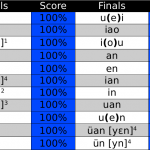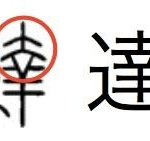Articles in the ‘Intermediate’ category Page 31
-
Three steps to more and better Chinese listening practice
Learning to understand spoken Chinese takes time. This article looks at three strategies for better Chinese listening practice for long-term learning.
Read → -
What you intend to write is more important than the character you actually write
Why is focusing on intent important when learning to write Chinese characters? What you intend to write is more important than what you actually write.
Read → -
How to find a suitable Chinese name
Finding a good Chinese name can be hard. If you care about your name, you should make an effort to find a good one.
Read → -
Focus on initials and finals, not Pinyin spelling
Instead of worrying too much about Pinyin spelling and what sounds each letter represents, students of Mandarin should zoom out a bit and focus on initials and finals as whole units. There are only around 60 of them and focusing on them will pay off handsomely.
Read → -
How knowing your best performance in Chinese can help you improve
When learning Chinese, it’s important to know how good your best performance is, because this determines the way you study. If your best performance is good enough, you mostly need high-volume practice, more of the same will get you there. But if your best performance isn’t good enough, you need to change tactics and go for high-quality practice instead.
Read → -
How translation to another language can help you learn Chinese
Have you tried translating Chinese to your native language as learning method? You should; it has more benefits than you might realise!
Read → -
How to find the time and motivation to read more Chinese
Learning to read in Chinese requires time and motivation, and this is what this article is about. How do you make yourself read more? How do you stay motivated when learning? Don’t forget to share your own experiences in the comments!
Read → -
Learning how to ask for and receive directions in Chinese
Asking for and receiving directions in Chinese might look very easy, it’s usually in the first part of a textbook series after all, but most students go through that chapter without actually learning the content. In this article, I discuss how to really learn this skill.
Read → -
Why you should think of characters in terms of functional components
Learning about the structure of Chinese characters can help enormously when learning the language. This article is an in-depth look at functional components, i.e. parts of characters that give the whole character either its meaning or its sound. It’s also a discussion about why we really shouldn’t talk so much about radicals when learning Chinese.
Read → -
Launching Hacking Chinese Challenges
Welcome to a new section of the website: Hacking Chinese Challenges! I will run monthly challenges in different areas of language learning where we strive to reach our goals and/or beat each other. I will also share related resources and advice. The first challenge starts on Friday, but you can join right now!
Read →








